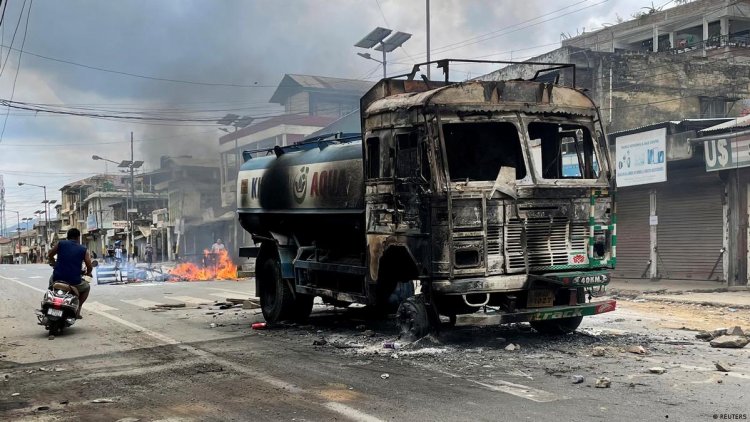Manipur: Rebuilding Trust between Ethnic Groups
Asia News Agency

After five months of ethnic violence that has claimed more than 170 lives, the state’s chief minister, N Biren Singh, now seems to recognise the imperative of rebuilding trust between the state’s ethnic groups. In an interview to The Indian Express, he said that his ‘top priority is to initiate dialogue with all affected communities, including the Kukis and Meiteis’, even as the state continues its efforts for ‘resettling displaced individuals’ and ‘rebuilding damaged houses’.
Manipur’s ‘outsider’ problem
Disturbingly, however, Singh blames the crisis in Manipur largely on ‘illegal migrants’, or on Manipur’s ‘outsider’ problem.
Like most northeastern states, The Indian Express writes “Manipur is a patchwork of cultures, faiths and ethnicities, many of which have complicated histories. The situation is made more fraught by landholding patterns and the continuing impact of colonial policies that segregated the state’s tribal-dominated hill areas from the Meitei-dominant Imphal Valley…..
“The Manipur government has done well to crack down on drug dealers. But that should have been accompanied by measures to improve livelihoods in a state which had the lowest per capita income in the northeastern region in 2021-2022 — it ranked the highest in the early 1990s. The CM has, instead, sought to give an ethnic dimension to poppy cultivation — he has linked the problem to ‘illegal migrants’ from across the Myanmar border with whom the hill people share a common ethnicity."
Revoking the Free Movement Regime (FMR)
In September, Singh requested the Centre to revoke the Free Movement Regime (FMR) which allows people residing close to both sides of the India-Myanmar border to venture 16 km deep inside the two countries without any documents. While experts agree that the FMR needs regulation, given the significance of trans-border commerce in Manipur’s economy, they also caution against the complete fencing of borders. “Singh’s harping on the outsider-infiltrator spectre does little to assure hill tribes that his government is above the identity politics that has already pushed the state to the brink….”
Earlier, in September 2022, the FMR was temporarily suspended in the wake of the coup in Myanmar in February 2021 and the inflow of refugees into Mizoram, Manipur and Nagaland.
India, Myanmar borderlands are cultural spaces
The temporary suspension of the FMR is explicable writes Thongkholal Haokip (Assistant Professor, Centre for the Study of Law and Governance, Jawaharlal Nehru University, New Delhi) “given the acute political unrest and fragile security situation in the neighbouring country from where large scale inflow of refugees has become exigent in Mizoram. But, India and Myanmar have never had a history of violent boundary disputes. Most of these boundary settlements were largely arbitrary — the concerns of local people were hardly kept in mind before the boundary lines were drawn or settled.”
These borderlands “are cultural spaces where people from the same ethnic stock inhabit contiguous areas. In times of trouble, ethnic ties are much stronger than state-imposed borders and laws, which Mizoram has demonstrated in the last two years. Manipur shares a border of about 390 km with Myanmar. Only about 60 km of this stretch has been taken up for fencing by the central government while the rest continue to remain porous. In the increasingly security-centric border management, the FMR has been a recognition of the lived realities of borderlands."
Many of the villagers on the Indian side of the border, explains Haokip “depend on the economic activities in the Kabaw valley for livelihood. The lack of all-weather roads on the Indian side of the border forces them to walk a few metres east, across the porous border and on to the India Myanmar Friendship Road, linking Moreh-Tamu-Kalemyo-Kalewa, to travel to Moreh via Tamu, and then to Imphal and other parts of the country.
“The lack of proper medical facilities in many villages in the extreme southeast of Manipur has also forced villagers to avail the nearby facility in Khampat, a small township mainly of Kuki-Chin inhabitants in Myanmar. As an informal practice, the Myanmarese authorities would allow such travel after a casual identity check to ascertain whether they were from the so-called ‘border villages’. Such an informal border regime has been the practice since the early days of Independence. In fact, those belonging to the border villages were hardly even aware of the FMR, until recently.”
Kuki demand for extension of FMR up to 80 km
The Kuki insurgent groups, who are engaged in peace negotiations with the Centre, demand the extension of FMR up to 80 km (aerial distance) on both sides of the Indo-Myanmar border and 120 hours or five days stay with visa-less entry and movement for the Kuki people. The call for a permanent revocation of the FMR by the Manipur government, “therefore, makes the situation more precarious in the light of the five-month-long unrest, that has deepened the chasm between the politically dominant Meitei community — mainly settled in the heart of state — and the trans-border Kuki community. This is especially so when the crisis of food and medical supplies in the borderland deepens due to the continuous blockade in Imphal valley.”
















